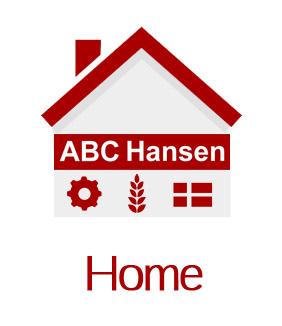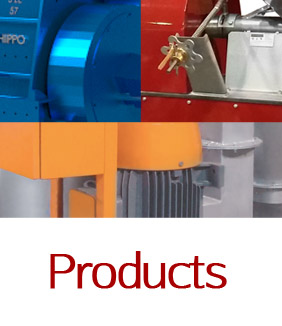Maize Milling Plants: Some options to consider
Please take a few minutes to read through the following brief outline of various types of milling systems if you are not entirely au fait with milling and the various options you may consider. ABC Hansen can provide you with the turnkey solution your market demands from you and balance this with your budget constraints as far as possible.
Three types of maize meal is sold and generally classed in this part of the world namely super, special sifted and sifted.
- Super maize meal is de-germinated before milling and would be classified as the best grade in terms of low fat content and low fibre content – essentially as pure as possible starch with long shelf life.
- Special sifted is non-de-germinated meal, slightly coarse than super while finer than sifted and with some more fine powder and more coarse particles and high fat content and short shelf life.
- Sifted meal would have more bran and germ meal present and while it is doubtless the healthiest maize meal it also has the shortest shelf life, is very coarse and is not generally preferred.
The now defunct South African Maize Board defined Super and Special maize meal as follows:
| Super Maize Meal | Special Maize meal | |
|---|---|---|
| Fat | Less than 2% | 2% min, 3% max |
| Fibre | 0.8% max | 1.2% max |
| Particle size | 90% >1,400my | 90% > 1,400my |
| 90% > 300my |
The milling process starts with cleaning the grain and is usually followed by conditioning the maize (dampening the maize with water and then allowing it to condition for some time in a bin to allow the bran to separate easier from the endosperm).
Cleaning and conditioning of the maize as an important step in the process and refers to the removal of foreign material and all that is not maize kernels from the to-be milled grain that lowers the quality of the product such as husk, straw, dust, sand, everything too big and too small and lighter than a maize kernel.
It also refers to the removal of poisonous seeds, and material harmful to the milling equipment such as metal and stones. Conditioning refers to the addition of moisture to the maize to allow the bran to be peeled off in flakes during milling with plate or roller mills, allowing easy separation in a sifter and, most importantly to add mass to the meal – no harm in selling 2% of water is there?
Following this process, milling can commence and may take several forms:
Hammer milled straight run maize meal would generally represent an undefined class, probably closest associated with Special Sifted maize meal and represents the lowest cost option and suitable to many rural applications and even national preferences. This meal is often considered inferior by the trade in areas like South Africa and Kenya, for the following reasons:
All the bran, germ and endosperm are ground up and hammered through the aperture in the hammer mill screen. This has the result that the meal:
- Has a short shelf life (the germ becomes rancid after milling). The same problem as with Special Sifted maize meal.
- Has a great deal of "powder" which results in high adsorption of moisture and fast release of this moisture when cold, resulting in a layer of water over the "pap" in the morning and turning the porridge sour.
- The porridge cooks with a slightly yellow color although the raw meal may look dazzlingly white.
- Bran, with a higher water adsorption than endosperm apparently gives a bloated feeling to the eager eater.
ABC Hansen manufactures the Hippo range of cast iron hammer mills able to fill this need should it be selected.
Mill prices of Hippo hammer mills start here at around R16,000 up to R200,000, mainly dependent on capacity.
An interesting NEW DEVELOPMENT by ABC has been the introduction of a de-hulling attachment to be placed on all Hippos, from sizes 1 through 57. This has the effect that high quality maize meal can be produced with the hammer mill only. The requirement is to dampen and condition the maize for about 30 minutes before feeding it into the Hippo with the de-hulling screen and at reduced speed, after which the samp is run through the same machine again at high speed and with different screen. The chop is collected separately. Two Hippo mills are used with one drive and with an aspiration attachment on the first mill, normal milling on the second mill and finally a sifter. A cleaning system, conditioning etc. is required for this system.
This option would offer a low cost plant and a fully fledged Special Sifted maize meal and could be referred to as a Hippo Special Sifted milling system at 500kg to 1,200kg per hour capacity.
In many areas milled straight run maize meal through our Hippos are used for opague traditional beer through 1.2mm screens. Products like Mahango (finger millet ) in Namibia is milled through finer screens on a straight run basis.
Maize may also be de-germinated or polished prior to milling through a Hippo hammer mill with 1.6mm screen providing a very good quality Special Sifted or Super meal. De-germination plants start at around R60,000 for 500kg/hr up to R1535,000 for 1.5 ton per hour etc. This cost should be added to that of the mill itself of course.
For good quality maize meal:
- De-germinate the maize at either 3 tons per hour, 1,5 tons per hour or 500kg per hour capacity.
- Then mill the samp and chips (the de-germinator or polisher separates the bran, germ meal and endosperm) by means of a plate mill or a hammer mill or a roller mill.
- Sifting the meal into three fractions – between 200micron and 8- micron representing super maize meal, below 200 micron and above 800 micron representing special sifted maize meal and over 1,600 micron sifted maize meal.
In order to mill Super Quality roller milled maize meal therefore:
- De-germinate the maize prior to milling
- Milling with rollers, hammer mills or plate mills / disc mills.
- Sifting
Alternatively, if the budget is small, the whole maize, after cleaning and conditioning (see above) may be milled by means of the plate/ disc mill or roller mill only and then sifted (without de-germination). A significant part of the bran and germ meal would then be sifted off, resulting in a Special Sifted meal – of lower quality than roller milled meal and higher quality than hammer milled meal.
Should you be interested in the higher end, both in terms of price, but also quality, we would recommend our range of roller mills:
The Hurricane range: 500 x 250mm roller mill stands in either double (4 rollers or 2 pairs) or single (one pair, two rollers) in combinations ie double roller stands (4 rollers), triple roller stands (six roller) and quad roller stands (8 rollers). These plants are erected horizontally over one level only and starts at around R450,000.
The Typhoon range: 800mm and 1000mm and 1,250mm pneumatic roller mill stands in double (4 pairs/8 rollers combination) or single (two pairs/4 rollers) combinations. These are gear driven high capacity industrial roller stands. These milling plants starts at capacities of 3 tons per hour and is generally erected over three levels with prices starting at around SA Rands 3 Million.
The Typhoon Millenium range are pneumatic, timing belt driven, fully electronic state of the art roller stands in the 1000 and 1250 mm double (4 pairs) and single (2 pairs) stands.
With this range of milling equipment we are able to provide milling solutions from 500kg per hour to 10 tons per hour and more and for budgets from R15,000 to R8 million!
A further element of major importance is sifting. Milling and sifting, form the very essence of grain processing.
The sifters we supply in every system would be one or more of the following:
- Turbo sifters – two separation horizontally shafted with steel screens – high capacity but not sifting very fine – used in small capacity plate mill systems and as graders for samp and other primary grading after de-germinators.
- Rotary sifters – three separation horizontally shafted with nylon screens – lower capacity but very fine screening – used in small capacity plate mill systems.
- Mini plan sifters – relatively high capacity and very fine screening used as primary sifters for all mills of 1 ton per hour to 2.5 tons per hour.
- Plan sifters in various sizes and numbers of passages: Very high capacity and fine screening – used in all mills with capacity of 2.5 ton per hour and more.
Industrial type mills can be constructed over one level, two levels, three levels or more, as existing buildings determine or as practical as the solution may be. High capacity mills normally require more levels to make use of gravity in moving product between mills and sifters.
When evaluating any quotation, be sure that you are comparing apples with apples. Note detail. Where silos are included, note its relative value as it can make an offer 25 – 30% more than without silos. Note also that a turnkey solution is usually offered with exclusion of civil works and construction. Consider the package. We usually include all electrical switchgear and its installation. This, together with plant installation can contribute as much as 15 - 25% of the final project cost and would be paid, whether you know about it from the outset or find it out later. We also ensure the switchgear is of high quality and in accordance with SABS requirements with circuit breaker, overload and contactor for every motor, IP rated, sufficient emergency stops etc.
Another option to consider, is to place a small mill (500kg – 1,000kg/hr) in a container. This is only recommended for special applications where buildings are problematic, where the mill needs to be moved from time to time to another location, where temporary power is used and where the mill is located in very remote areas. An advantage to this is that installation takes place at the factory and therefore excludes expensive installations charges at remote locations. Note however that containerized mills can not be exported via sea-freight as the container is altered.
We include grain intake and storage systems only on request while in any plant quoted, conditioning bins is usually included. Capacities for grain storage may range between 35 tons to 10,000 tons per silo unit. We normally recommend maintaining storage of at least 10 days milling at full capacity with the mill, ie. a 500kg per hour mill should have storage of at least 120 tons at the mill while a 2 ton per hour mill should have storage of at least 500 tons. Since we are agents for one of the foremost silos manufacturers in America and the world we can always offer you the very best prices for storage at the leading edge of technology.
We believe that an informed customer would make the correct purchase decision so do not hesitate one moment to discuss any point which may be of concern to you, with us.
ABC Hansen Africa has built many flour and maize mills around South Africa, Africa and overseas and we are partnered or represent major companies in Europe, the UK, Turkey, the USA and Scandinavia. We are also importers and erectors of silos, feed plant manufacturers, flour mills, starch plants, bakeries, mini breweries, malting plants.
We look forward to your further instructions and order.




